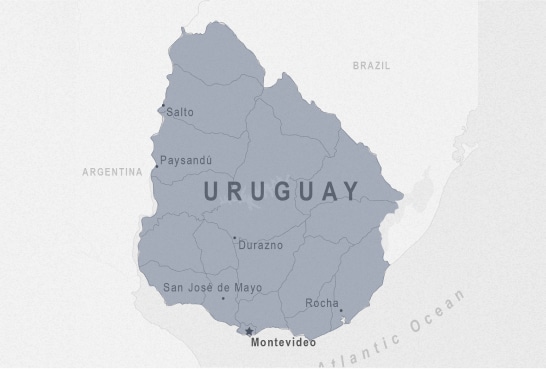Market Spotlight: Uruguay



-
Uruguay is a regional leader in terms of the ease of doing business, ranking in the top 5 of LATAM countries, and offers significant advantages to those evaluating business opportunities in South America.
-
As part of Mercosur, the “Southern Common Market,” Uruguay benefits from free trade zones, free ports, and free airport arrangements with fellow members.
-
The country serves as a regional distributor for Mercosur due to its strategic location between Argentina and Brazil.
-
Uruguay is a high-income per capita country with low levels of inequality and poverty, boasting the largest middle class in Latin America (60% of the population).

-
Uruguay enjoys an open economy with Mercosur countries, however levies high duties and taxes on imported goods from non-trade agreement countries.
-
Products from the U.S. are subject to a Common External Tariff set by Mercosur, up to 35%, based on the value of the imported product.
-
Uruguay is in negotiations for free trade agreements (FTA) with China and Turkey, which would add to its FTA’s with Mexico and Chile.
-
Uruguay, in conjunction with Mercosur, has extended trade agreements with the Andean Community Nations, European Union, and the Southern African Customs Union.

-
Uruguay has moderate English proficiency, ranking 49 out of 111 countries, and 8 of 20 LATAM countries, according to Education First English Proficiency Index.
-
The main language is Spanish, with Portuguese common near the Brazilian border to the North and Portuñol, a mix of Portuguese and Spanish. Foreign executives should be prepared with Spanish-translated business material and an interpreter, as needed.
-
To capitalize on its immersion into the global marketplace, Uruguay has integrated online English learning platforms in schools connecting English teachers to students from its capital Montevideo, Buenos Aires, Argentina, the Philippines, and the UK.

-
Uruguay has a labor force participation rate of 62.6%, edging out the global average of 59%.
-
With the largest middle class in LATAM, Uruguay is experiencing an aging population which may cause long-term challenges for the workforce but may present opportunities for migrant workers.
-
The minimum wage in Uruguay is UYU21,106 per month (USD $541 per month).

-
While Uruguayans adopt a carefree attitude in social engagements, however business meetings always start on time and are met with formal handshakes. (Do not be surprised if you are greeted with a kiss on the right cheek, as Uruguayans may increase physical touch as business relationships grow.)
-
Suits and ties are expected at business meetings, along with sharing business cards at the beginning.
-
Schedule meetings in advance but be sure to follow up the day before with a phone call, as Uruguayans prefer modes of communication other than email.

-
Uruguay is ranked the 27th freest economy out of 177 countries with a score of 70.2 scoring, second in LATAM behind Chile.
-
Its income distribution is one of the most evenly distributed in the region, according to the World Bank’s Gini Index Report.
-
Covid-19 sent Uruguay into its first recession in 20 years, impacting unemployment rates and poverty levels, but has since rebounded with a GDP growth rate of 4.4% (as of 2021).
-
There are strong institutions in Uruguay with low corruption, high trust in the government, a strong rule of law, and a thriving consensus-based political approach, making it an attractive destination for FDI.


